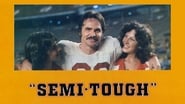tieman64
The majority of Michael Ritchie's early films focused on the competitiveness and ruthlessness of a then contemporary United States. Be it "Downhill Racer" (1969), "Bad News Bears" (1976), "Smile" (1975) or "The Candidate" (1972), all his films during this period are explicitly about competition, American institutions and individuals who put their personal goals (and/or profits) before a team, community or group (or vice versa).One of Ritchie's weakest films, "Semi Tough" is a shapeless and abrasive satire which focuses on the world of American Foodball. Ritchie takes aim at obsessions with winning, self-help programmes, health fads and the vanity and vacuity of the self-obsessed. His overall target, though, is a more generalised form of "self-improvement". American capitalism itself hinges on a certain unquenchable, existential lack. The consumer is always unfulfilled, always in need of completion, an anxiety which capitalism incessantly creates desires to exploit. Failures to attain contentment are then transfered back to the subject, leading to guilt and an escalation of transfered desires; maybe the next hit will bring completion. Elsewhere the film watches as children of the 1960s struggle in their search for meaning a decade after vague promises of liberation collapsed. What they latch onto is essentially a New Age cult which mixes narcissism and individualism with corporate maxims. Other Ritchie themes are brought up - the costs and violence of winning, exacted on both winners and losers etc - but it all feels forced, Ritchie trying too hard to be the next Altman. Tonally, the film struggles to juggle comedy, satire and drama."Semi Tough" is criticised for being smug and abrasive, but that's understandable, considering it's populated by smug, abrasive and self-obsessed characters. The film would begin Ritchie's slide into more mainstream, forgettable territory. Robert Altman's similarly themed "HEALTH" was released one year later.5/10 - Worth one viewing.
moonspinner55
Advertised as a sexy comedy about pro-football players and their women, this Michael Ritchie film, based on the book by Dan Jenkins, instead takes aim at fads and other eccentricities of the 1970s, using the sports world as a backdrop. It wasn't the big commercial hit some were predicting, though it garnered good notices for Burt Reynolds, doing another of his amiable walk-throughs. Jill Clayburgh, just prior to her breakthrough in "An Unmarried Woman", plays the daughter of the football team's owner, and her rapport with Reynolds is surprisingly instantaneous. Kris Kristofferson, on the other hand, ends up playing straight man to her and pal Reynolds, and the third-wheel position subdues low-keyed Kristofferson even further (he evaporates). There are some funny potshots at the EST craze, with Bert Convy well-cast as a self-help guru, but the romantic comedy at the heart of the piece never quite takes off. Ritchie puts all his sting into the absurdities happening around the principals, a move which consequently leaves the finale seeming half-baked. ** from ****
Pangborne
People don't seem to know how to respond to this movie. The people whowant "Smokey and the Bandit" think it's weird and not funny; the peoplewho want "Scenes from a Marriage" think it's sophomoric. Well, it isweird and occassionally sophomoric, but it is very, very funny in anunderhanded, ironic way - and also in an over-the-top goofball way. Youbetter be prepared for different kinds of jokes coming at youunexpectedly. This obviously big-budget studio comedy has more in commonwith discursive satires like "Smile" or "Nashville" than other studiocomedies of the period, although it is far more well-made and plottythan either "Nashville" or "Smile": I think it's the best of both worldssatire and spontaneity wrapped up in a comfy old-fashioned romanticcomedy. Think "My Man Godfrey" with four letter words and football. It'strue the characters do not have exactly novelistic depth, but surelyCarole Lombard's character in "Godfrey" was as thin as a pancake - butit didn't matter because Lombard was playing her, and she made up indizzy star-power what the writers left out. Here Jill Clayburg is theLombard part, a real star at the top of her game, radiating star-poweredcharm. Matching her watt for watt is Burt Reynolds, perfectly cast, andable to make the odd-ball anti-intellectualisms of the writing soundperfectly effortless. Kris Kristofferson is in the Ralph Bellamy part -the guy whose job it is to get jilted - but he oozes a full-bore sexualmagnetism that makes the heroine's confusion perfectly understandable.This is real neglected gem - you shall recognize it for the dunces arein a c
groucho-33
Supposedly based on the book of the same name, the only similarities are the characters' names -- SOME of the characters. Some of the best ones, such as Elroy Blunt, greatest country/western singer ever to warble a tune, were left out completely. The whole thing is a shame, because this was by far the funniest book I ever read. I remember eagerly anticipating the forthcoming movie back in 1977. Then I heard that Burt Reynolds, Kris Kristofferson and Jill Clayburgh were the stars and thought "oh-oh." Still, I went to see the movie -- just awful. Watched it again a couple of years ago with the hope that time might have taken the edge off. Wrong; it was worse than ever. While I respect the "favorable" reviews given by some above, it's obvious that they didn't read the book. I'd invite them to do so, then watch the movie again and see how they'd rate it again.




